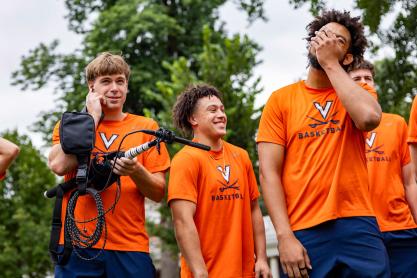If you saw the viral Coldplay “kiss cam” video of a married tech CEO and the company’s chief human resources officer embracing and then quickly trying to evade the camera, you are not alone.

Andrea Press, a media studies and sociology professor, says another reason the video went viral is because “people want to be in the know.” (Photo by Adrienne Eichner)
Since an attendee at the Boston concert posted the footage online last week, her post has been viewed more than 122 million times.
The scandal has sparked memes, advertising campaigns and copycat videos to capitalize on the salacious moment.
University of Virginia media studies experts say the spectacle lays bare some unfortunate truths about human nature.
“People have always been fascinated by a sexual scandal and that is, I think, what we’re seeing here – kind of a sexual betrayal,” said Andrea Press, UVA’s William R. Kenan Jr. Professor of Sociology and Media Studies.
The chair of the department noted similar moments in time.
“I’m thinking about when Eddie Fisher left Debbie Reynolds and ran off with Elizabeth Taylor in 1956 and left (Reynolds) with two little kids,” Press said. “Pictures of her with her two little kids were flashed all over the media and the tabloids. The whole country knew that. Even before social media, scandal sold and was very popular.”
The kiss cam moment also reveals another truth about society today: the lack of privacy. There are cameras everywhere.
“I think young people understand that they are not in private when they’re out in public,” Press said. “This is kind of a Gen Z sensibility. But these people were older. So they, I guess, were shocked that all of a sudden, they were flashed on the screen in public. But they shouldn’t have been. They should have understood.”











